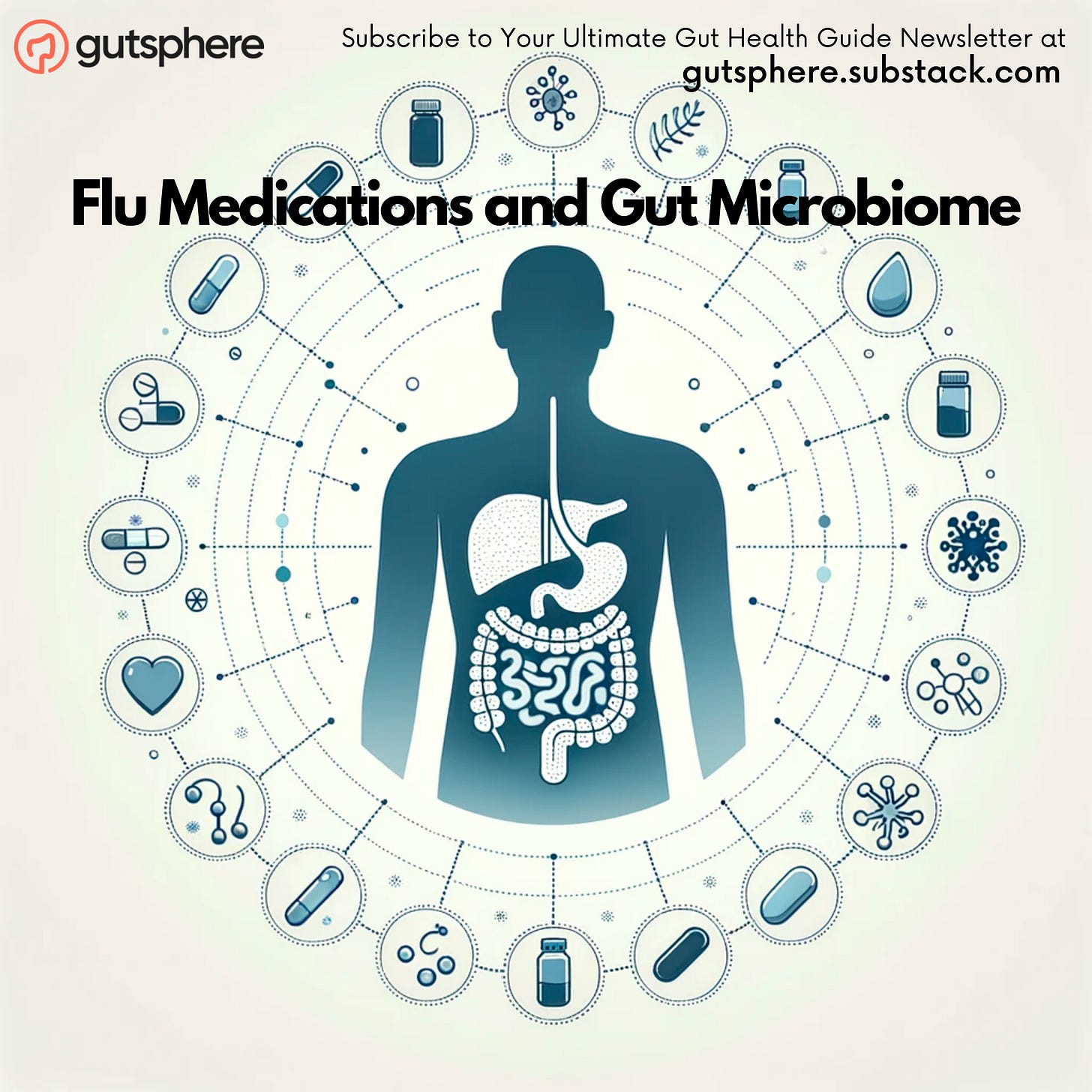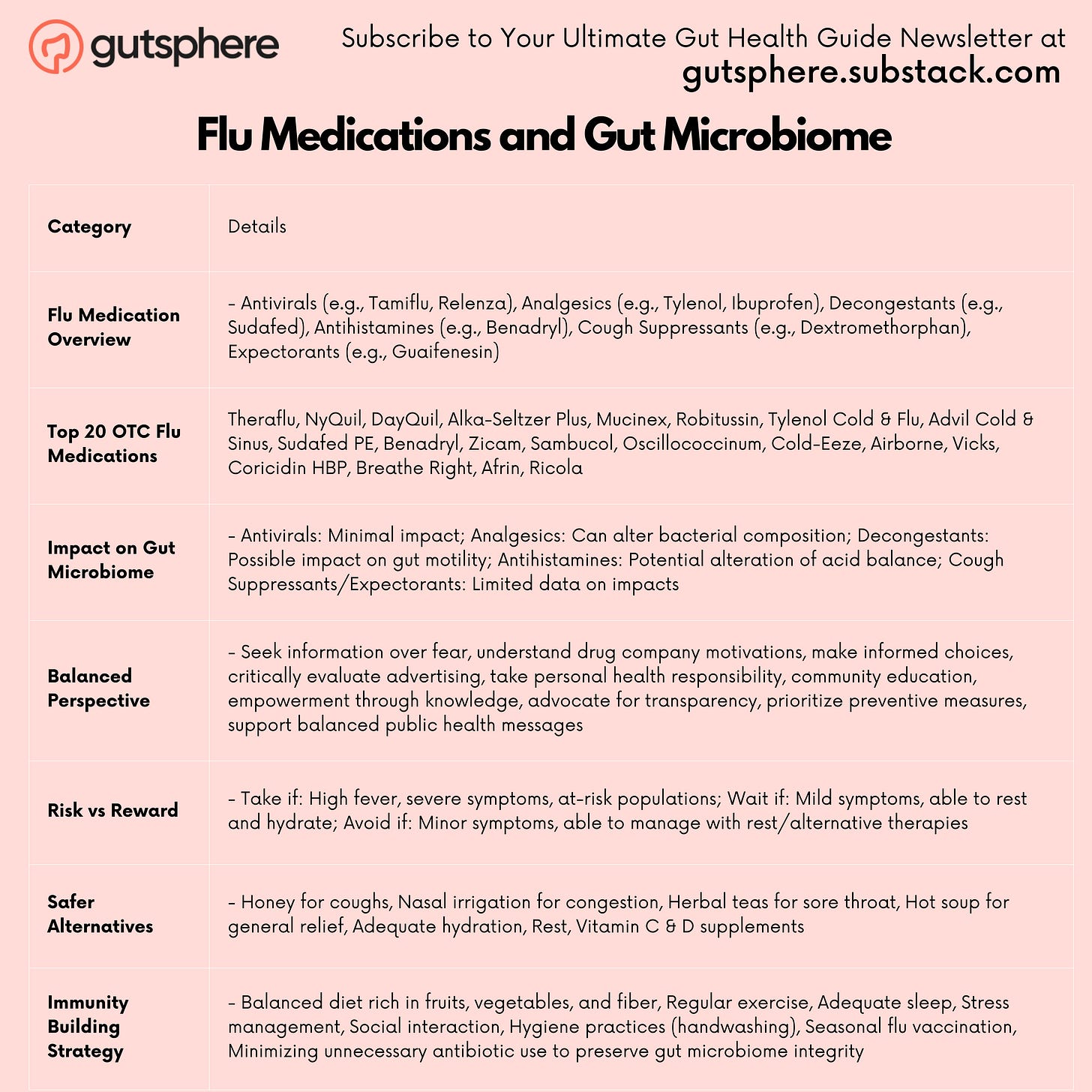Flu Medications and Gut Microbiome
Navigating Flu Season: Medication, Microbiome, and You
Hi GutSphere Community
We understand the discomforts that come with flu season and the instinct to reach for quick relief. Today, we're unpacking the science behind OTC flu medications and their relationship with our gut microbiome — because we believe in informed choices that serve our overall well-being.
The overzealous use of pharmacological agents can indeed influence the gut microbiome, altering its composition and potentially leading to dysbiosis, which can impact overall health and immune function. Here's a detailed overview focusing on common anti-flu medications, their potential impact on the gut microbiome, and safer alternatives where applicable.
Common Anti-Flu Medications and Their Impact on the Gut Microbiome
Oseltamivir (Tamiflu)
Impact: While not known for directly affecting the gut microbiome significantly, any oral medication has the potential to alter gut flora due to changes in the gut environment.
Safer Alternative: Natural antivirals like elderberry, which has been shown to reduce the severity and duration of flu symptoms, may offer a gentler option without the same risk of microbiome disruption.
Zanamivir (Relenza)
Impact: As an inhaled medication, it has less direct impact on the gut microbiome compared to oral drugs. However, all medications can have indirect effects, such as through changes in immune response.
Safer Alternative: Steam inhalation with essential oils like eucalyptus might provide symptomatic relief for upper respiratory infections.
Amantadine (Symmetrel)
Impact: It has a broader spectrum of antiviral activity but can affect the gut microbiome, as it may alter the pH of the stomach and influence gut bacterial growth.
Safer Alternative: Rest, hydration, and proper nutrition can help the body combat the flu virus naturally.
Rimantadine
Impact: Similar to amantadine, with potential impacts on the gut due to changes in gastric conditions.
Safer Alternative: Vitamin C and zinc supplements have been proposed to support immune function during flu infections.
Acetaminophen (Tylenol) and NSAIDs (e.g., Ibuprofen)
Impact: While primarily used for symptomatic relief of fever and pain, these can disrupt gut microbiota and barrier function, especially with prolonged use.
Safer Alternative: Using a cool compress for fever and ensuring adequate rest might be a non-pharmacological approach.
Antibiotics (Misused for Viral Infections)
Impact: Antibiotics can significantly disrupt the gut microbiome by eliminating beneficial bacteria, even though they are not effective against viruses.
Safer Alternative: Avoid antibiotics for flu unless there is a bacterial co-infection, as confirmed by a healthcare provider.
Decongestants and Antihistamines
Impact: May alter gut motility and microbiome composition, though the impact is generally less severe than antibiotics.
Safer Alternative: Nasal irrigation with saline can provide relief without affecting the microbiome.
Probiotics (as adjunct therapy)
Impact: These can support the gut microbiome, especially if dysbiosis occurs due to medication use.
Safer Alternative: Fermented foods and beverages can be a natural source of probiotics.
Evaluating Trade-offs: Risks vs. Rewards
Before reaching for that pill, consider the trade-off. Sometimes the body's natural response to the flu, unpleasant though it may be, serves a purpose in the healing process. Medications can mask symptoms, which are, in fact, manifestations of the body's battle against the virus.
Embracing a Balanced Perspective on Flu
Flu is indeed a part of human life, and while it can be severe, particularly for certain populations, understanding and acceptance can lead to more effective prevention and care. Here's a concise framework that can be adopted:
Acceptance: Recognize that the flu is a common illness that most people will encounter at some point.
Preparedness, Not Panic: Educate yourself on flu symptoms and treatments without succumbing to fear.
Preventive Measures: Focus on maintaining good health practices to reduce the likelihood of getting the flu.
Rational Response When Sick:
If you do get the flu, respond sensibly by resting, staying hydrated, and seeking medical advice if symptoms are severe or persistent.
Community Mindfulness:
When ill, take steps to prevent the spread to others, such as staying home, practicing good respiratory hygiene, and wearing a mask if necessary.
Healthy Habits All Year Round:
Maintain a healthy lifestyle throughout the year to bolster your immune system against the flu and other illnesses.
Knowledge and Updates:
Stay informed about flu seasons, vaccine updates, and public health recommendations.
Support Systems:
Create and maintain support networks for assistance during times of illness, whether for physical care, food delivery, or emotional support.
Resilience Through Experience:
Understand that recovering from flu can make you more resilient and better prepared for future encounters with the virus.
Reflection and Adjustment:
After a flu episode, reflect on what worked well for recovery and what could be improved, adjusting your health strategies accordingly.
Building Natural Immunity: A Multi-Faceted Approach
Here are key strategies to naturally avoid the flu and bolster immunity, with a focus on the gut microbiome:
Diverse Microbiome Exposure:
Engage in social activities responsibly.
Exposure to diverse environments can help, such as parks, forests, and farms.
Own pets, which can bring a variety of microbes into your home environment.
Hygiene Balance:
Practice good hygiene, but avoid over-sanitization.
Regular handwashing with soap is essential, especially before eating and after using the bathroom.
Nutrition for the Microbiome:
Eat a varied diet rich in whole foods, fibers, and fermented products to nourish your gut microbiome.
Include prebiotics and probiotics to support gut health and immunity.
Stress Management:
Chronic stress can weaken the immune system, so practice stress-reducing activities like meditation, yoga, or any relaxing hobby.
Adequate Sleep:
Prioritize sleep, as it’s crucial for immune function.
Develop a regular sleep schedule to improve sleep quality.
Regular Exercise:
Moderate, regular exercise can boost the immune system.
It may also increase your exposure to a diverse set of microbes, particularly if you exercise outdoors.
Vitamin D:
Ensure adequate vitamin D levels, either through sunlight exposure or supplements, to support immune function.
Flu Vaccine:
Get the seasonal flu vaccine, especially if you’re in a high-risk group. Vaccination can reduce the severity of the flu or prevent it altogether.
Minimize Exposure During Peak Flu Season:
During the height of flu season, take extra precautions such as avoiding crowded places when possible.
Be Informed:
Stay updated on flu activity in your area and take advice from health experts seriously, especially during an outbreak.
Closing Thoughts
As we navigate the peak of flu season, let’s pledge to honor our body's inherent wisdom. The advertisements may be convincing, but we know our health narratives are more complex. We are for medication when necessary, but also for the mindfulness that nurtures our long-term well-being.
Next: Home Remedies: Comfort & Microbial Harmony
Request
Share
Our sincere request to you is to share the newsletter with your friends, family, and community so that they can benefit from the content. Also it will help us grow the newsletter, and eventually, as we release more content, digital tools, and more we will enable people around the world to live chronic disease free.
Subscribe
Feedback
Also, please give us feedback so that we can improve the content. And if there are any topics that you want us to cover please send us your questions and topics. Furthermore, if you try any of the things we provided information please share your experience with us.
Thank You
GutSphere Team
Disclaimer
Please note that the information provided in this newsletter is for informational purposes only and should not be considered as a substitute for professional medical advice, diagnosis, or treatment. If you have any concerns or questions about our health, please consult with a licensed healthcare professional. The information contained in this newsletter is not intended to diagnose, treat, cure, or prevent any disease. The publisher and authors of this newsletter assume no responsibility for any adverse effects that may result from the use of the information contained herein.



